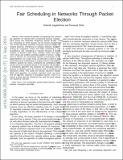Fair Scheduling in Networks Through Packet Election
Author(s)
Jagabathula, Srikanth; Shah, Devavrat
DownloadShah_Fair scheduling.pdf (285.7Kb)
OPEN_ACCESS_POLICY
Open Access Policy
Creative Commons Attribution-Noncommercial-Share Alike
Terms of use
Metadata
Show full item recordAbstract
We consider the problem of designing a fair scheduling algorithm for discrete-time constrained queuing networks. Each queue has dedicated exogenous packet arrivals. There are constraints on which queues can be served simultaneously. This model effectively describes important special instances like network switches, interference in wireless networks, bandwidth sharing for congestion control and traffic scheduling in road roundabouts. Fair scheduling is required because it provides isolation to different traffic flows; isolation makes the system more robust and enables providing quality of service. Existing work on fairness for constrained networks concentrates on flow based fairness. As a main result, we describe a notion of packet based fairness by establishing an analogy with the ranked election problem: packets are voters, schedules are candidates, and each packet ranks the schedules based on its priorities. We then obtain a scheduling algorithm that achieves the described notion of fairness by drawing upon the seminal work of Goodman and Markowitz (1952). This yields the familiar Maximum Weight (MW) style algorithm. As another important result, we prove that the algorithm obtained is throughput optimal. There is no reason a priori why this should be true, and the proof requires nontraditional methods.
Date issued
2011-03Department
Massachusetts Institute of Technology. Department of Electrical Engineering and Computer ScienceJournal
IEEE Transactions on Information Theory
Publisher
Institute of Electrical and Electronics Engineers (IEEE)
Citation
Jagabathula, Srikanth, and Devavrat Shah. “Fair Scheduling in Networks Through Packet Election.” IEEE Transactions on Information Theory 57.3 (2011): 1368–1381.
Version: Author's final manuscript
ISSN
0018-9448